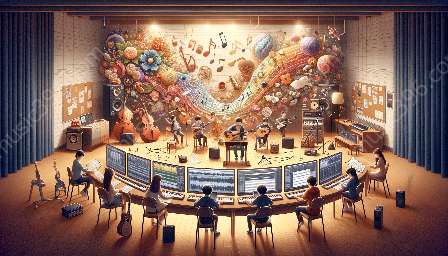Music education is a vibrant and dynamic field that constantly evolves to embrace new and innovative teaching methods. In this topic cluster, we delve into the impact of innovative teaching methods on music and culture, exploring how they promote inclusivity, creativity, and diversity. From technology-enhanced learning to culturally responsive pedagogy, discover the diverse approaches that are shaping the future of music education.
The Role of Innovative Teaching Methods in Music Education
Innovative teaching methods play a crucial role in shaping the landscape of music education. They not only enhance the learning experience for students but also contribute to the preservation and evolution of musical traditions and cultural heritage. By incorporating innovative approaches, music educators can engage and inspire students, fostering their passion for music and encouraging them to explore diverse musical genres and styles. Additionally, innovative teaching methods empower educators to create inclusive and accessible learning environments that cater to the diverse needs and interests of students.
Technology-Enhanced Learning in Music Education
Technology has revolutionized music education, providing educators with powerful tools to enhance the teaching and learning process. From digital composition software to virtual reality simulations of live performances, technology offers innovative avenues for students to explore and create music. In addition to facilitating interactive and immersive learning experiences, technology enables music educators to personalize instruction, adapt to different learning styles, and reach students from diverse cultural backgrounds.
Culturally Responsive Pedagogy in Music Education
Culturally responsive pedagogy acknowledges and celebrates the diverse cultural backgrounds and musical traditions of students. By integrating culturally relevant materials, music educators can create an inclusive learning environment that reflects the rich tapestry of global music cultures. Through culturally responsive pedagogy, students not only gain a deeper understanding of music from various traditions but also develop a greater appreciation for cultural diversity, fostering respect and empathy for different cultural practices and artistic expressions.
Innovative Approaches to Music Theory and Composition
Exploring innovative approaches to music theory and composition opens new horizons for students to express their creativity and individuality. By incorporating modern techniques and interdisciplinary connections, educators can inspire students to push the boundaries of traditional musical structures and experiment with innovative compositional styles. Embracing contemporary trends in music composition, such as electronic music production and fusion genres, encourages students to engage with diverse musical influences and develop their own unique artistic voices.
Promoting Collaboration and Community Engagement
Innovative teaching methods in music education emphasize the value of collaboration and community engagement. Whether through project-based learning initiatives, interdisciplinary collaborations with other arts disciplines, or partnerships with local cultural organizations, these methods encourage students to cultivate teamwork, leadership, and social responsibility. By fostering a sense of community and interconnectedness, music educators empower students to make meaningful contributions to the cultural fabric of their communities through music.
Innovative Teaching as a Catalyst for Cultural Exchange
By embracing innovative teaching methods, music educators become catalysts for cultural exchange and dialogue. Creating opportunities for students to engage with music from different cultures and historical periods fosters an appreciation for global interconnectedness and mutual understanding. Through cross-cultural collaborations, students develop a broader perspective of music's role in shaping and reflecting diverse cultural identities, promoting empathy and cultural sensitivity.
Conclusion
As music education continues to evolve, innovative teaching methods play a pivotal role in shaping the future of the field. By embracing technology, cultural diversity, and creative experimentation, music educators can inspire a new generation of musicians and cultural ambassadors. The impact of innovative teaching methods goes beyond the classroom, contributing to the enrichment and advancement of music and culture on a global scale.






















